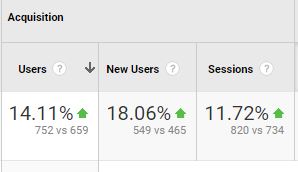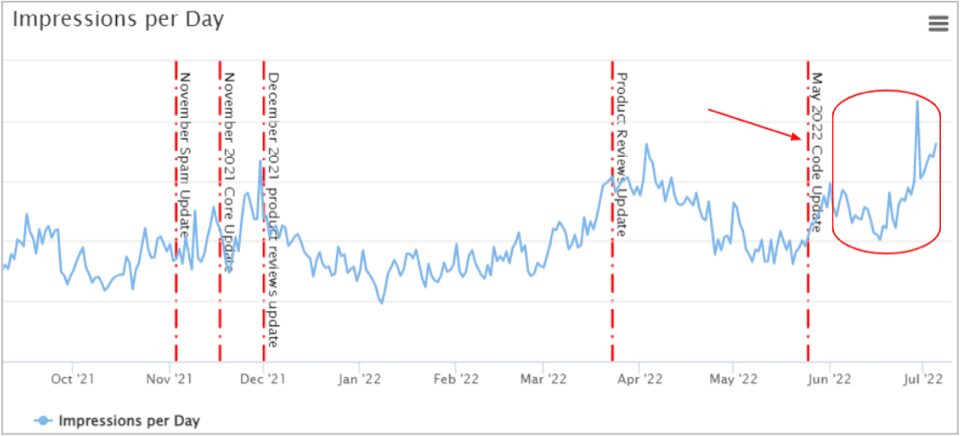One of the most sizable Google algorithm updates in the past 10 years has started rolling out this week.
Named the ‘Helpful Content Update’, the primary function of this update is to filter out websites that have a high amount of unsatisfying, irrelevant, or unhelpful content. Expectations are that the algorithm will take two full weeks to roll out, beginning with August 25th.
Google has stated this is an “ongoing effort to reduce low-quality content and make it easier to find content that feels authentic and useful in search”.
The goal of this change is to help searchers find pages that are considered “high-quality” and cut down on how often users stumble across an unhelpful webpage. This is a way of rewarding those who use white hat SEO tactics (those who build sites and produce content in a consumer focused way to gain organic traffic) and punishing marketers for using black hat SEO (practices that try to increase a page’s rank through trickery and violating terms of service).
Coalition’s copy optimization approach has always prioritized creating a great mix of uniquely branded, consumer friendly content that includes search engine friendly optimizations.
Over 10+ years in SEO, we’ve seen our client sites benefit from algorithms such as this! As a result, we’re well-positioned to comment on the likely outcomes from this update, and how to improve your site if you receive a negative outcome after it’s done rolling out.
Table of Contents
How the Google Helpful Update Affects Your Rankings
While most algorithms are applied on a page-by-page basis, Google’s helpful content update will be rolled out sitewide. This means that if Google determines your site is producing a relatively high amount of unhelpful content written mostly for ranking higher in the search, then your whole site will be impacted, not just pages (specific URLs) on the site.
That’s a crazy big deal: sitewide updates are not overly common and could mean much more catastrophic losses for sites that are found “unhelpful”.
If you are worried about being hit, the first place you may check is Google Search Console (GSC). When logged in to your Search Console account, there won’t be any apparent Google declared penalty or manual action notice. Instead, you’ll see the impact applied in actual traffic and rankings.
Google Search Console also operates on a delay, so checking your Google Analytics account and doing a day-over-day and week-over-week comparison could provide additional insight into the impact of this update on your site.
A quick day over day comparison of August 25th to August 18th (Thu vs. Thu the week prior), shows significant gains in new users for one of our B2B clients:

“Sitewide algorithm updates can cause significant losses of organic ranking for a wide number of pages, resulting in large traffic and revenue losses. You won’t necessarily see a big drop on any one page or keyword, rather, you’ll see it across a larger number of keywords and pages,” shared Rebecca Fairbanks, our ecommerce Director of Marketing. “Most of the brands that have been working with us on their SEO campaigns typically see some benefit from a broader algorithm update.”
We’ve included a screenshot from a client’s reporting platform below. They began working with us in the spring of 2022, after seeing repeated drops following algorithm updates with a prior SEO agency. A noticeable spike in impressions followed our campaign adjustments following the May core algorithm update.

How Does this Update Impact SEO Strategies?
In their blog post, Google was careful to mention that this update does not invalidate following SEO best practices. They stated, “SEO is a helpful activity when it’s applied to people-first content” and linked to their SEO starter guide. As long as your site has SEO that adheres to their standards, your ranking should not be negatively affected by Google’s helpful content update.
Coalition’s guiding principle for SEO over the last thirteen years has been “Consumers first, clients second, and search engines third”. A good SEO strategy provides a clear benefit to likely consumers of our clients’ products and services in a way that search engines can appreciate.
If you’ve ever worked with an SEO company and felt that you’re being advised to do things just for the sake of search engines, you may not be in line with Google’s guidelines for webmasters. Great SEO strategies may be helpful to a search engine, but never at the expense of search user experience.
What updates should you make to your SEO strategy today if you’re concerned about your site being deemed “unhelpful”?
To help decrease the risk of your site being pushed down in the rankings, Google has said that “removing unhelpful content could help the rankings of your other content”.
That means you should take some time to review your top ranking pages in Google’s search engines and decide if they are unhelpful or not. What does unhelpful look like in Google’s eyes?
Content that is (a) excessively sourced from other publishers, (b) content that appears to have been generated by machine learning or AI tools, (c) content that is exceedingly redundant within a site, and (d) content that covers too diverse a range of topics may trigger Google’s unhelpful flag.
“As a result of this content update, we’re conducting widespread evaluations for our current and former clients,” said Joel Gross, Coalition Technologies’ CEO and founder. “By doing this, we ensure our clients’ websites are considered helpful by Google after the content update and are better positioned to support brands negatively impacted by former SEO agencies’ work. While we aren’t concerned about clients whom we have a long history of working with, we are skeptical of those who may have had much of their content created by others.”
Joel noted sites found to be at risk for unhelpful content may have pages removed from indexing, redirected, or improved significantly to avoid a negative outcome, or to improve outcomes after a negative impact is realized.
“We are not being overly aggressive on making changes to sites that seem to have a good history with Google,” he continued. “We don’t want to do more harm than good by removing great ranking content accidentally, when it’s not clear if it really is going to result in a negative outcome. Many SEOs will attempt to sell the fear, and in the process, not only potentially undermine good SEO campaigns, but also result in unnecessary expenses for the businesses who bite on that fear-based sales pitch.”
Many SEOs will attempt to sell the fear, and in the process, not only potentially undermine good SEO campaigns, but also result in unnecessary expenses for the businesses who bite on that fear-based sales pitch.”
Joel Gross, CEO of Coalition Technologies
Does the Algo Update Target Specific Industries?
While this update does not specifically target a specific niche, Google said these types of content may be impacted the most:
- online educational materials
- arts and entertainment
- shopping
- tech-related
Why?
Generally, these types of sites are dependent on viewers and visitors, rather than actual engaged consumers. Most of their money is generated from affiliate revenue or advertising placement so they are less beholden to an actual consumer to provide meaningful content and site experiences.
Some of the bad practices that are often repeated in these types of sites include:
- widespread duplication of content from other sites,
- lack of meaningful editorial practices,
- creating overly keyword-optimized SEO copy, and
- imbalance between unique content production and duplicate content.
Sites in these categories may also publish across a wider range of topics, diluting Google’s perception of their expertise and value in any one subject matter.
If you’re not in those industries, you don’t want to write this off as nothing- its the underlying bad behaviors that are being punished, not the actual verticals themselves.
Producing Human-First Content
If you’re wondering how you go about producing content that is beneficial to humans, according to search engines at least, Google doesn’t want you to be in the dark.
Like with the Panda update, core updates, and product reviews update, Google has provided a list of questions you can ask yourself about the content on your site. These questions should be asked and answered in order to build content that is rewarded by Google’s helpful content update. Some of the implied strategies have been a part of our copy best practices for years.
- Do you have an existing or intended audience for your business or site that would find the content useful if they came directly to you?
- Does your content clearly demonstrate first-hand expertise and a depth of knowledge (for example, expertise that comes from having actually used a product or service, or visiting a place)?
- Does your site have a primary purpose or focus?
- After reading your content, will someone leave feeling they’ve learned enough about a topic to help achieve their goal?
- Will someone reading your content leave feeling like they’ve had a satisfying experience?
- Are you keeping in mind our guidance for core updates and for product reviews?
And when it comes to avoiding search-engine first content, Google laid out these questions:
- Is the content primarily to attract people from search engines, rather than made for humans?
- Are you producing lots of content on different topics in hopes that some of it might perform well in search results?
- Are you using extensive automation to produce content on many topics?
- Are you mainly summarizing what others have to say without adding much value?
- Are you writing about things simply because they seem trending and not because you’d write about them otherwise for your existing audience?
- Does your content leave readers feeling like they need to search again to get better information from other sources?
- Are you writing to a particular word count because you’ve heard or read that Google has a preferred word count?
- Did you decide to enter some niche topic area without any real expertise, but instead mainly because you thought you’d get search traffic?
- Does your content promise to answer a question that actually has no answer, such as suggesting there’s a release date for a product, movie, or TV show when one isn’t confirmed?
What Does This All Mean?
What the Google helpful content update boils down to is Google punishing sites that put an emphasis on SEO-first content and elevating sites that produce helpful, human-first content.
As long as the pages on your site are SEO optimized and follow Google’s guidelines, your site will be fine. It may even be pushed up in the rankings. If your website has pages made solely for the purpose of trying to cheat the system, the entire site will be buried under helpful content. Reach out to the experts at Coalition Technologies and let us make sure your website continues to rank well after Google’s helpful content update.


